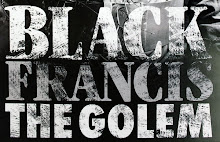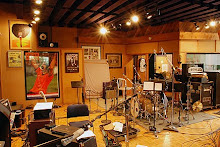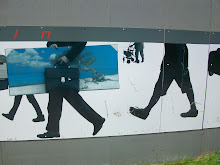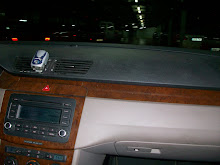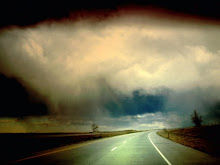Saxophonist David S. Ware, A 'One-Of-A-Kind' Improviser, Has Died
Fri., October 19, 2012
By Patrick Jarenwattananon
The saxophonist David S. Ware, one of the most prominent and powerful musicians dedicated to free improvising, has died. The cause was related to a 2009 kidney transplant. He was 62 years old.
Based in New York, Ware was a member of bands led by pianist Cecil Taylor and drummer Andrew Cyrille, and led the David S. Ware Quartet for over 16 years. Most of his creative output could be classified as avant-garde jazz, though Ware often stressed his connections to jazz history he once recorded the entirety of Sonny Rollins' Freedom Suite, for instance and aligned his musical goals with celestial ones.
"I'm on the spiritual path with this thing called music, playing an instrument," he told Josh Jackson of WBGO in 2011. "I'm using music as a vehicle for transcendence. ... Ultimately, it's not about reaching any end, for any practical purposes."
Along the way, Ware did enjoy practical success, or at least acclaim. He remains best known for his quartet, which started in 1989 and ran until 2007, with pianist Matthew Shipp, bassist William Parker and a succession of drummers: Marc Edwards, Whit Dickey, Susie Ibarra and Guillermo E. Brown. Ware's quartet was documented on Homestead Records, at the time predominantly an indie-rock label; recruited by Branford Marsalis to make several albums for Columbia Jazz, a major label; and called "the best small band in jazz today" by the prominent critic Gary Giddins in 2001.
In his last decade, Ware was documented often on AUM Fidelity, a record label run by Steven Joerg (who first brought him to Homestead), who was also his manager. When kidney disease forced Ware to undergo a kidney transplant in 2009, Joerg led the successful charge to find a donor.
In an e-mail, Matthew Shipp, his longtime pianist, remembered his colleague:
Playing with David S. Ware for 16 years was a dream. To be able to play with a conceptualist who understands the whole tenor tradition but who had the vision to pursue a very focused and original quartet concept was a tremendous experience.
David is such a unique person a one-of-a-kind type cat. Who else synthesized Sonny-Rollins type sax virtuosity with a post-Cecil-Taylor-Unit-Structure type focus with a post-Coltrane-Quartet type spirituality? His lines and themes carry great weight.
David was a minimalist and a maximist at the same time. I know no one else I can say that about he had his own unique sound with tremendous depth, soul, and his music has a deep compassion in it.
David's gift to the world is his quartet concept as much as his sax virtuosity.
David was a man of tremendous paradox, which added to his mystery: a peace-loving pacifist who had a love for and collection of firearms. He loved cars and speeding in cars. He had a tremendous sense of humor, but was so focused on who he was in the music what his vision was one of the most austere artists I've ever known. He never had any doubt about who he was and what he should be doing in the music, and he traveled a straight line with no confusion to his equation. I think of David as a great iconoclast in the tradition of other iconoclasts like Sun Ra, Thelonious Monk or anyone who pursues a personal vision to the end. But as focused an artist as David was, he was also a regular guy. Like I said earlier, he loved cars, loved ultimate fighting and the UFC, etc.
I have many, many stories I could tell about David but the most important thing is that he went against the grain and changed jazz history by developing an original concept when people thought that there was nothing new you could do with music that came out of a free jazz aesthetic. He proved them wrong and added great beauty to the world.
http://www.gpb.org/news/2012/10/19/saxophonist-david-s-ware-a-one-of-a-kind-improviser-has-died#
David S. Ware Quartet - Solar Passage - Cryptology (1994)
David S. Ware Quartet - Godspelized - Godspelized (1996)
Pianist Matthew Shipp Says Goodbye to Tenor Colossus David S. Ware
Tenor saxophonist David S. Ware managed to change the history of jazz through authenticity and substance, writes Matthew Shipp, his longtime pianist.
Oct 21, 2012 8:18 AM EDT
By Matthew Shipp
In jazz, you often hear talk about how there are no more Miles Davises or John Coltranes.
Such talk misses the point, for people who formulate questions like this usually would not recognize the answer if it was in front of them. It would be presumptuous of me to declare anyone the next great player, for only time decides these questions. But this week we are mourning a jazz innovator—tenor saxophonist David S. Ware, who died from complications of a kidney transplant at age 62—and whose provocative body of work will continue to be listed to by those with ears to here for some time to come.
Ware situated himself in the jazz avant-garde tradition, meaning he was influenced by Coltrane and Albert Ayler—but perhaps paradoxically he was a protégé of the great tenor-sax bopmaster Sonny Rollins, who took the then-teenage Ware under his wings.
While he held a solid footing in jazz tradition and technique, Ware charted a course as an iconoclast from the beginning, generating a body of work that is striking in its originality, strength, tenderness, modernity, and inevitability.
Ware is best know for a quartet he assembled in 1989 that included myself on piano, William Parker on bass, and four different drummers during its 16-year run. His sound translated into many worlds, and Ware recorded with the quartet for Sony-Columbia jazz (Miles Davis’s label), blue-chip European and Japanese jazz labels, avant-garde label AUM Fidelity, and alternative-rock labels Homestead Records and Thirsty Ear.
Gary Giddins, perhaps the world’s most preeminent jazz critic, wrote in The Village Voice in 2001:
“Let’s be bold: The David S. Ware Quartet is the best small band in jazz today ... Every time I see Ware’s group or return to the records, it flushes the competition from memory.”
Strong words from a critic who has a reputation to maintain, especially keeping in mind that David was ignored by lots of people in the jazz world back then. He never even placed in the polls of jazz magazines at his height and only started to gain notice in them after he had a kidney transplant.
But at the height of the Ware quartet, we had generated a whole culture around the quartet and indie-rock youth felt it. We were signed to a slew of alternative-rock labels as a jazz act. The kids felt how the lyricism of the music and the energy related—something that jazz critics and even some players back then had trouble reconciling.
David has left behind a comprehensive body of work that touches on jazz past, present, and future—he understood the whole tenor and jazz tradition, but brought his own voice to it, and to our quartet. Some have compared our unit to the classic Coltrane quartet, but the members of our group all brought something to the table that only someone playing now could bring—resulting in a gestalt that is of its time and does not look back. When free jazz seemed like a spent force, he brought something new—and greatly beautiful—to it.
Ware stubbornly stuck to his artistic vision from the beginning to the end, through bad times—he drove a cab for years and turned down many viable commercial opportunities while he was formulating his quartet—good times, and health issues.
As I wrote elsewhere about Ware:
“David was a man of tremendous paradox, which added to his mystery: a peace-loving pacifist who had a love for and collection of firearms. He loved cars and speeding in cars. He had a tremendous sense of humor, but was so focused on who he was in the music—what his vision was—one of the most austere artists I've ever known. He never had any doubt about who he was and what he should be doing in the music, and he traveled a straight line with no confusion to his equation. I think of David as a great iconoclast in the tradition of other iconoclasts like Sun Ra, Thelonious Monk or anyone who pursues a personal vision to the end.”
So Ware leaves this earth a victor. In a world where conformity is prevalent and privilege from the beginning is usually what guarantees success, he managed to change the history of jazz through authenticity and substance.
David S. Ware - Peace Celestial - Surrendered (2000)











































































































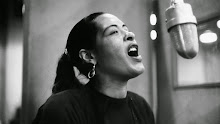



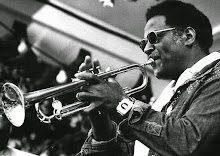
































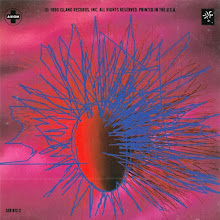






































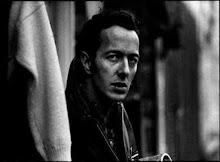


























![Emilio Aragón [Miliki]](https://blogger.googleusercontent.com/img/b/R29vZ2xl/AVvXsEgU984UtiH44tEevrjWKEP26uzJpkSR0NMPCyUzIg16SRop9lUziLazCa4V3Ol9LgmRdnzgHiyLD-8SPVx7J7cZt1G5jmzE1lDfWyzlvXaq7dp2EQ5OLle-bBG3ZcovVu5h00ZzuOwXVCo/s220/Gracias+Miliki%2521.jpg)

























































































































































